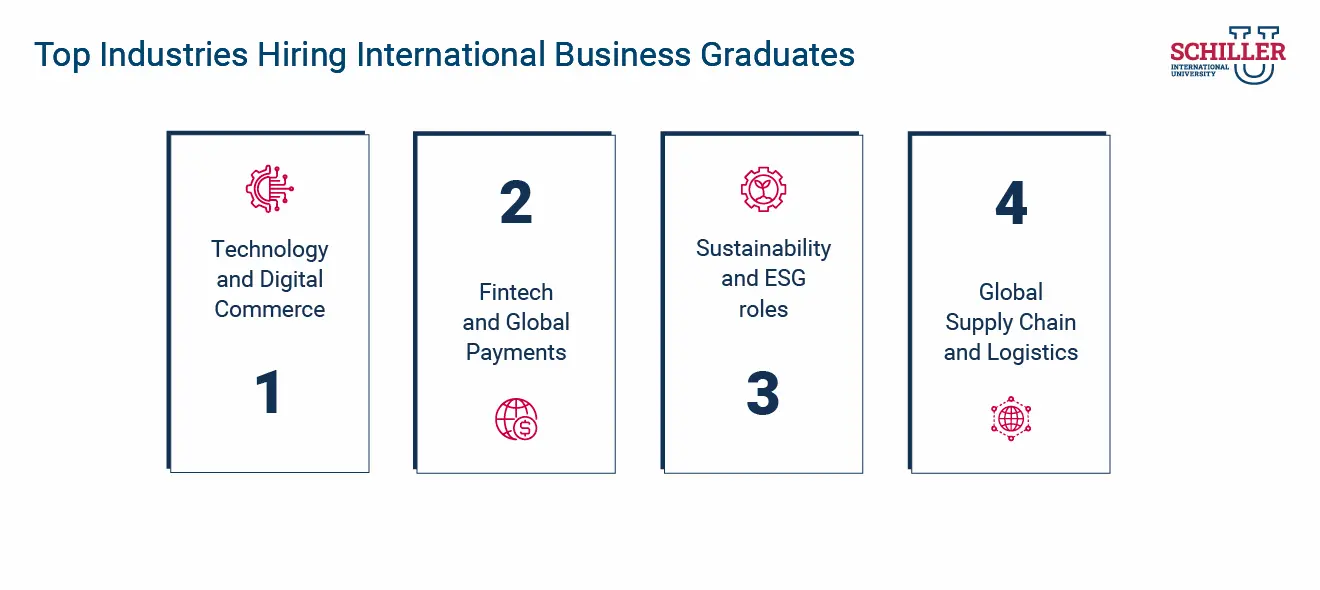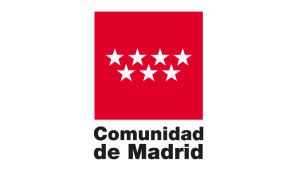International business is the thread holding the global economy together, connecting markets, cultures, and industries. Emerging technologies are transforming how multinational corporations operate, automating tasks in global marketing, international finance, trade compliance, and supply chain management. This shift is creating space for new international business career paths, where graduates who combine cross-border expertise with technology-driven insights can lead global teams, manage international projects, or launch ventures with worldwide reach.
Understanding it today will help you prepare for career opportunities after studying international business that go beyond traditional roles in marketing, trade, finance, and management. By learning about global markets, cross-cultural dynamics, and technology-enabled strategies, you can build a lucrative career at the intersection of global commerce and innovation.
Key Skills You Will Gain in an International Business Program
International business theories look a lot different in practice from the words printed in textbooks. What you will gain in this program are the skills required for international business careers that global employers value.
- Strategic thinking and global marketing: Learn how to analyze markets across countries and create data-driven campaigns that will resonate on an international scale.
- International finance and analytical problem-solving: Develop the ability to evaluate financial performance, spot investment opportunities, and make data-driven decisions in a global context.
- Cross-cultural communication and leadership: Gain the confidence to lead diverse teams, negotiate across borders, and manage projects in multiple countries simultaneously.
- Business analytics in international markets: Use insights from data to guide international strategy and spot growth opportunities.
With these skills, you can explore career opportunities in international business, from multinational corporations and global startups to your own international ventures.
Top 10 Career Opportunities for International Business Graduates
With almost everything a click away, businesses are operating in a borderless economy. Companies across industries, be it technology, finance, manufacturing, or litigation, are looking for professionals who understand intercultural nuances and can operate on a global stage. With a degree in international business, you can explore some of the most in-demand roles where your skills can make a real impact:
1. International Marketing Manager
Design campaigns that speak to global audiences. The challenge will be balancing brand consistency with local insights. From influencer partnerships in Asia to digital storytelling in Europe, this role combines creativity with strategy.
Industries: Technology, FMCG, fashion, and digital media.
2. Global Business Analyst
Analyze international markets, competitor data, and emerging economic trends to guide business expansion. This role is crucial in today’s data-driven world, where companies rely on global insights to make high-stakes decisions.
Industries: Finance, consulting, information technology (IT), and e-commerce.
3. Management Consultant
Advise multinational companies on market entry, organizational efficiency, and cross-border operations. Consultants with global experience are highly sought after to help brands navigate economic shifts and sustainability transitions.
Industries: Consulting, corporate strategy, and professional services.
4. International Trade Specialist
Manage import and export operations, negotiate trade deals, and ensure compliance with all international regulations. These skills are critical as global trade adapts to digitalization and shifting geopolitical alliances.
Industries: Manufacturing, logistics, government, and global trade.
5. Import/Export Manager
Handle logistics networks, customs operations, and supplier partnerships that keep global trade moving efficiently. This role is increasingly central to companies that are diversifying supply chains in international business post-pandemic.
Industries: Logistics, retail, automotive, and consumer goods.
6. Global Supply Chain Manager
Oversee the flow of products, data, and capital across borders. It ensures resilience in an era of supply chain disruptions and sustainability goals.
Industries: E-commerce, pharmaceuticals, electronics, and FMCG.
7. International Human Resources Manager
Recruit and lead diverse teams, aligning corporate culture with regional dynamics. This role is key to global talent mobility and inclusive workplace development.
Industries: Multinationals, technology, consulting, and manufacturing.
8. International Financial Analyst
Assess multinational investments, evaluate currency risks, and forecast financial performance for global operations. As businesses expand into emerging markets, this role blends finance with global foresight.
Industries: Banking, investment firms, financial technology (fintech), and global corporations.
9. Business Development Manager
Identify and secure international partnerships, helping companies grow beyond domestic boundaries. It is a role that thrives on networking, cultural intelligence, and strategic thinking.
Industries: Startups, SaaS, energy, education, and healthcare.
10. Entrepreneur / Startup Founder
Build ventures designed for international audiences from day one, whether in sustainable technology, cross-border e-commerce, or global education. Entrepreneurs with an international mindset are shaping the future of global innovation.
Industries: Technology, e-commerce, sustainability, and social impact.

Emerging Opportunities in International Business
The structure of global commerce is shifting and fast. Digitalization and artificial intelligence (AI) mean that cross-border trade, payments, and marketing now happen in real time. At the same time, companies are hiring for sustainability, fintech, and project-oriented roles that did not exist a decade ago. That creates clear career opportunities after studying international business for graduates who pair global judgment with technical fluency.
- Digital Commerce: Rapid growth in cross-border e-commerce opens roles in international digital marketing, marketplace ops (Shopify, Amazon, Etsy), localization and cross-border payments and compliance.
- Sustainable Business and ESG: Firms need people to translate environmental, social, and governance (ESG) rules into commercial strategy, sustainability strategy, ESG data, and sustainable procurement, which are in demand.
- Fintech and Cross-border Payments: Payments, remittances, and B2B trade-finance and compliance technology need graduates who understand rails, foreign exchange (FX) risk, and regulation.
- International Project Management: Market entries, supply-chain redesigns, and sustainability rollouts call for coordinators who can run projects across time zones (PMP and Agile helps).
- Remote and Hybrid Work: Many global roles are now remote. Be ready to work asynchronously, use digital collaboration tools, and show cross-border results on your CV.
Why Program Choice Matters
Understanding international business education is the first step toward building a truly global career. With the right program, you will build the mindset, gain global exposure, and experience to navigate real-world challenges across borders. Whether you dream of leading cross-continental teams, expanding brands into new markets, or launching a global venture, your education should prepare you to operate with confidence in an interconnected economy.
At Schiller International University, you learn business where it actually happens across continents. Through our intercampus mobility program, you can study in Tampa, Madrid, Paris, or Heidelberg, moving between campuses after your first year. Schiller’s International Business programs blend academic depth with practical, multicultural experience. You will gain hands-on learning through internships, global networking, and industry projects, developing the adaptability and cross-cultural intelligence employers value most.
Whether you pursue the BS in International Business to begin your global journey or the MBA in International Business to advance your leadership path, with Schiller, you will build the skills to thrive in a world where international experience and innovation define success.
FAQs
Q1. What are the most in-demand careers after studying international business?
Answer: In 2025, top international business career paths include global marketing management, data-driven business analysis, sustainability consulting, international finance, and cross-border e-commerce strategy. Roles blending digital skills with global market insight are most in demand.
Q2. Which industries hire international business graduates the most?
Answer: Key employers include technology, finance, consulting, manufacturing, logistics, and e-commerce. Global trade and supply-chain roles, international project management, and sustainability-focused jobs are also among the fastest-growing segments.
Q3. What skills do employers look for in international business professionals?
Answer: Employers seek a mix of cross-cultural communication, digital literacy, global strategy, and data analytics. Soft skills such as adaptability, leadership, and collaboration across cultures are essential for global career success.
Q4. Can international business graduates work internationally?
Answer: Yes. International Business graduates are highly employable across borders, especially when they gain exposure through global internships, study abroad, or intercampus programs. Many alumni begin in Europe or the US and transition into remote or hybrid global roles.
Q5. What entry-level roles are suitable for fresh International Business graduates?
Answer: Common starting roles include Global Business Analyst, International Marketing Coordinator, Export Executive, Project Assistant, or Junior Consultant. These roles help you gain on-ground experience in global markets and build a foundation for management positions.

 Request information
Request information









